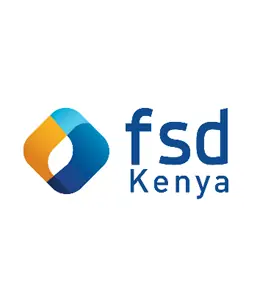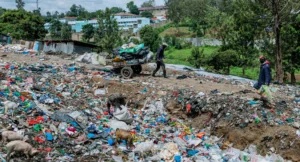
With the lack of basic services such as clean water, sanitation, and waste disposal, Kenya’s densely populated informal settlements produce a significant amount of waste daily. This includes plastic, household garbage, organic waste, and sometimes hazardous materials. Such areas face several challenges including, a lack of designated waste collection points, and narrow, unplanned pathways that make access difficult for waste collection vehicles. Residents in informal settlements typically have low incomes, limiting their ability to pay for private waste collection services. This economic constraint exacerbates the problem as public waste management services are often stretched thin.
The sprawling Mukuru settlement (Kwa Njenga, Kwa Reuben and Viwandani) in the eastern part of Nairobi is a case in point. The area measuring 689 acres, is home to an estimated 120,000 households, of which around 400,000 are young people. The lack of safe disposal of solid waste has become a real menace, contributing to soil, air and water pollution and putting health at risk, especially for children with no clean spaces to play.
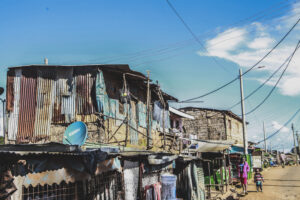
The consequences of improper waste disposal are particularly evident when it rains. Accumulated waste is washed from the roads and other public spaces into rivers and drainages causing blockages that heighten the risk of flooding. One of the most acute examples of this is the highly polluted Ngong River, which runs through Viwandani and Kwa Ruben settlements.
As experienced during Kenya’s recent heavy rainfall, informal settlements are particularly vulnerable to flooding, bringing a new set of challenges. During the rainy season, pit latrines overflow, causing pools of sewage to accumulate as raw fecal waste spills into homes and public spaces. This attracts insects and rodents and heightens the risk of water-borne diseases such as malaria and cholera, which can lead to severe illness or death. The elevated water levels also disrupt movement, preventing many children from attending school. Homes built along the riparian reserve are often swept away by floods, resulting in the loss of lives and property.
Tackling the waste challenge: Black Soldier Fly production
A 2019 study by AMT and the Mukuru SPA Environment consortium found that 72.5% of all waste generated was organic, 20.3% was recyclable and 7.1% was non-recyclable or hazardous matter. It was abundantly clear that finding sustainable solutions for dealing with both organic and recyclable waste will be a critical factor in the realization of viable waste management. One of the resulting actions was the launch of a pilot Black Soldier Fly (BSF) project to explore the viability of recycling organic waste. The aim was not only to deal with the immediate problem of waste disposal, but also open up opportunities for the local population to generate income from waste recycling, especially for youth.
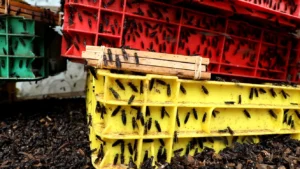
BSF production is a circular economy model that begins with waste separation and collection at the household level. Local youth groups oversee the collection process, ensuring that organic waste is gathered for BSF farming, recyclables are sold, and hazardous waste is aggregated at designated points for collection by the County Government.
Reaping the benefits
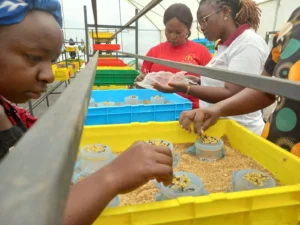
One of the immediate benefits of the BSF project has been a significant reduction of the amount of solid waste that needs to be transported to the city’s already overstretched landfills. It brings monetary value to the people involved in the project, through selling of larvae and frass.
Author: Fridah Kamwara
“You cannot put human rights on the table”
Add Your Heading Text Here
Lorem ipsum dolor sit amet, consectetur adipiscing elit. Ut elit tellus, luctus nec ullamcorper mattis, pulvinar dapibus leo.

